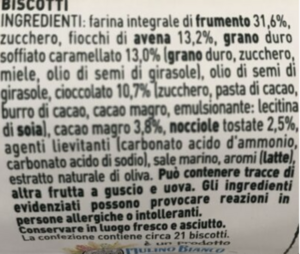✍️ Ingredients Spellcheck
Most ingredient lists are extracted from packaging images using Optical Character Recognition (OCR) techniques. However, due to factors such as poor image quality, product curvature, or light reflections, the OCR process may incorrectly recognize text characters.
These errors affect the Ingredients Extraction and Analysis process, impacting the overall quality of the database.
Recent advancements in Machine Learning, particularly with the development of Large Language Models, offer new opportunities to address this issue, where previous solutions have yielded limited success.
⭐ Guidelines
The impact of the Ingredient-Spellcheck needs to be controlled to avoid altering contributions and/or add new errors to "healthy" ingredient names. From the different types of errors observed across products, we came up with these spellcheck guidelines:
- Correct typos;
- Whitespaces between words and percentages shouldn't be corrected. The text needs to be kept as unchanged as possible (Example: `Ingredient 0,2 %`).
- If the percentage is ambiguous, we don't correct it. (*ex: "15 0%" - "396"*)
- The only case when a whitespace involving a percentage should be modified is if the *digit* is stuck in the previous word (*ex: cheese1.9% -> cheese 1.9%*)
- Some ingredients are enclosed with `_`, such as `_milk_` or `_cacahuetes_`, to detect allergens. Should remain unchanged. However, in the case it is not an ingredient, such as `_Cacahuetes_ con cáscara tostado. _Trazas de frutos de cáscara_.`, it needs to be modified into `_Cacahuetes_ con cáscara tostado. Trazas de frutos de cáscara.`;
- Some percentages were badly parsed by the OCR. Since we cannot be sure about what is the right value, it is preferable to keep it as it is.
- Accents and other language specific punctuations:
- In Romanian, the characters ["ş" (351), "ţ" (355)] (ASCII id) should be retrieved by the Spellcheck when necessary,
- Uppercase letters should remain unchanged => "ECOSSE" -> "ECOSSE"; "ÉCOSSE" -> "ÉCOSSE"
- If lowercase, accent should be added if missing.
- `*` should remain in the corrected text as much as possible (*ex: Schweinefleisch\* -> Schweinefleisch\**)
- Whitespaces shouldn't been modified except for these cases:
- When two words are stuck to each other: *"rizbrun -> riz brun*
- Regarding uppercases and lowercases, since the spellcheck should modify at least as possible lists of ingredient, we don't modify uppercases or lowercases except for two reasons: 1. After a period: `orange.trace de...` -> `orange. Trace de...`; 2. If it's a proper noun: `france`-> `France`
- In French, the character `oe` or `œ` should remain unchanged after correction (*ex: œuf, bœuf). If it is missing, should be replaced by default by `œ`.
- Commas and other word separators (, -, .) should be added to distinct ingredients. **We don't add a period** or modify the existing punctuation at the end of the list of ingredients - Example: *"citric acid electrolytes (salt, magnesium and calcium chlorides, mono-potassion phosphate)"* -> *"citric acid, electrolytes (salt, magnesium and calcium chlorides, mono-potassion phosphate)"*
- If ":" is missing to, such as `conservateur nitrite de sodium`, we add it: `conservateur: nitrite de sodium`
